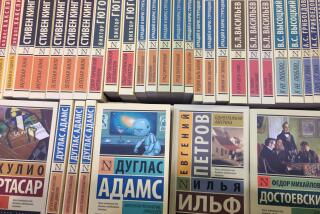Expatriate Sold on Living in Soviet Union : Yorba Linda Talk to Stress Reforms
- Share via
When San Francisco native Paula Garb returned from the Soviet Union after her marriage to a Soviet student dissolved in 1972, she never planned to go back, she said.
But with just a high school education and after one or two “very humiliating and depressing” years on welfare, she did return--and has been living in the Soviet Union since 1975.
She is now back in the United States on a 5 1/2-week lecture tour of six states and Ottawa, Canada, and will speak Sunday at the Yorba Linda Public Library on the impact of Soviet leader Mikhail S. Gorbachev’s reforms. Her trip’s expenses are being paid by sponsoring groups at the various stops, not by the Soviet government.
The 40-year-old mother of two earns a premium salary as a translator in a publishing house in the Soviet Union, has published two books and is pursuing a doctoral degree in ethnography at the U.S.S.R. Academy of Sciences. She said she recently has been lecturing and entertaining visitors at her home to pique mutual curiosities and dispel misconceptions held by citizens of the two superpowers.
Describing glasnost , Gorbachev’s policy of openness, as “a qualitatively new aspect of our lives” and “very exciting,” Garb said some Soviet teachers are telling students to “go with the press” rather than textbooks for accurate depictions of history.
“When I went to (Moscow) university, everything was cut and dried; you had to regurgitate what they had in books.” Now, debates are common in schools and are encouraged by faculty, Garb said Thursday from Arizona.
Garb grew up listening to tales of Russia by her father, according to her mother, Lillian Garb, 72.
At an early age, her daughter “became very intrigued with the cultural history (of the Soviet Union) and wanted to establish a relationship with the people she felt were her father’s people,” Lillian Garb said Thursday.
At 17, Paula Garb had two years of high school Russian and was “real idealistic about socialism,” she said, when she fell in love with her student tour guide on her first trip to the Soviet Union in 1965.
They married after she completed her final year of high school in San Francisco but separated five years later, in 1972. On returning to the United States, she found that it was a financial struggle to support her two sons and impossible to fulfill her “enormous desire” to go to college.
She finally chose the social benefits she had known in the Soviet Union--housing for less than 3% of her income, free university tuition and child-care services. Strong friendships already established in the Soviet Union served as an extended family for her, she said.
Moving back also eased her inner-city fears. Even though Moscow is a city of 8 million, there is “no crime, no pornography, no drug culture” to speak of, she said.
With her American-born sons, Gregory Danilenko, 15, and Andrei Danilenko, 21, Garb lives in a southwest Moscow suburb in a three-bedroom flat that would have cost her $1,000 a month in San Francisco, she said.
While she returns to San Francisco with her sons for visits every other summer, Garb, who retains her U.S. citizenship, said she has no regrets about settling in the Soviet Union.
Garb, who has obtained degrees in history and anthropology from Moscow University, is also promoting her books on her tour. Her first, “Where the Old Are Young--Long Life in the Soviet Caucasus,” stemmed from her master’s thesis on child-raising among the Abkhasian people by the Black Sea, many of whom live to be more than 90.
“They Came to Stay--North Americans in the U.S.S.R.,” published last year, describes experiences of expatriates like herself. Garb is writing her doctoral dissertation on the cultural and linguistic adaptations of North Americans living in the Soviet Union.
Garb’s 2 p.m. speech Sunday is sponsored by the North Orange County League of Women Voters and the Yorba Linda coordinators of “Soviets, Meet Middle America!” a project by the Center for U.S./U.S.S.R. Initiatives, which aims to bring 400 Soviet citizens into U.S. homes in 40 states this year.
More to Read
Sign up for Essential California
The most important California stories and recommendations in your inbox every morning.
You may occasionally receive promotional content from the Los Angeles Times.












